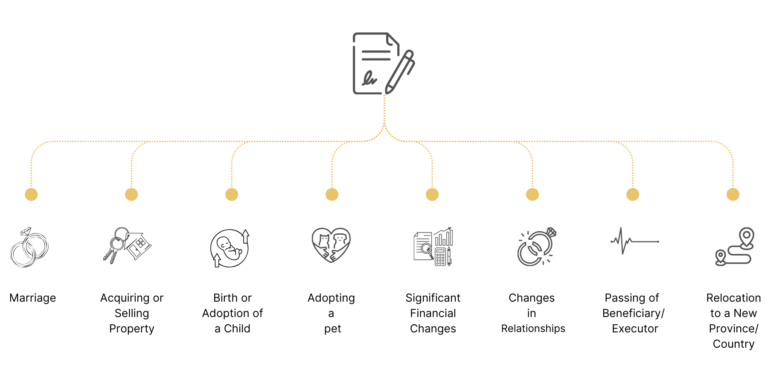If you have been delaying making a Will because it seems overwhelming, you are not alone. Creating a Will may seem daunting, but it doesn’t have to be. We have created this beginner-friendly guide to help you make a Will in Ontario with ease and simplify estate planning, step by step.
1. Basics
1.1 Legal Requirements to Make a Will in Ontario
In Ontario, a Will is legally valid if you:
- Are at least 18 years old and of sound mind
- Sign the Will in the presence of two witnesses who are not beneficiaries (or spouses of beneficiaries)
- Ensure the witnesses sign the Will in your presence
2. Preparing to Write Your Will
2.1 Gather Personal Information
Start by collecting your full legal name, date of birth, and location. You will also need to provide information about your family members and potential beneficiaries.
2.2 Understanding Your Assets
While you don’t need to list every asset in your Will, it’s important to have a clear understanding of what you own. This includes real estate, bank accounts, investments, and personal items of significant value. A Will typically distributes the residual estate, which is the value remaining after specific bequests, debts, and taxes are settled. However, you may want to allocate specific items or amounts to certain individuals or organizations.
2.3 Identifying Debts and Liabilities
Your executor will need to settle any outstanding debts before distributing your estate. It’s useful to be aware of mortgages, loans, and credit card balances when planning your Will, even if you don’t include them directly in the document. This ensures your executor can efficiently manage your estate.
3. Splitting Your Estate
3.1 Who Can Be a Beneficiary?
In Ontario, you can name anyone as a beneficiary, including family members, friends, or charities. However, you must keep legal obligations in mind for dependents like minor children or a spouse.
3.2 Residuary Estate and Specific Bequests
Your residuary estate is what remains after debts, taxes, and specific gifts are settled. Decide whether to divide this residuary estate equally or by percentages among your beneficiaries. If you have particular items (heirlooms, jewelry), you can also make specific bequests to individuals or organizations.
4. Appointing Executors
4.1 Role of an Executor
An executor manages your estate, settles debts, files taxes, and distributes assets. It’s a significant responsibility that requires trustworthiness and organizational skills.
4.2 How to Choose an Executor?
Choose someone responsible and trustworthy—this could be a family member, friend, or professional (like a lawyer). Name an alternate executor in case your first choice is unable to serve.
5. Naming Guardians for Dependents
5.1 Legal Guardianship Rules
If you have minor children, you can name a guardian in your Will. The court will consider your choice but ultimately decides in the best interest of the child.
5.2 How to Choose a Guardian?
Consider values, financial stability, and the potential guardian’s relationship with your children. Discuss the responsibility with the person you’re considering before naming them in your Will.
6. Including Specific Bequests
6.1 Personal Property
For specific items such as heirlooms, jewelry, or personal belongings, you can leave them to certain individuals. Be clear to avoid disputes or confusion.
6.2 Charitable Donations
Want to leave a portion of your estate to charitable organizations? You can do so through your Will, and these donations may offer tax benefits to your estate.
7. Writing and Validating Your Will
In Ontario, a holographic Will (entirely handwritten and signed by the testator) is legally valid, but it’s more prone to challenges and errors.
7.2 Lawyer-Drafted Wills
Having a lawyer draft your Will ensures that it’s legally airtight and reduces the chances of disputes. While it may cost more upfront, it can save your beneficiaries time and stress.
7.3 Creating an Online Will with Willezy
Willezy offers an easy-to-use platform that guides you through the process of creating a Will from the comfort of your home. In just minutes, you can customize your Will according to your circumstances, assign guardians, and make specific bequests—all online. Once completed, your Will is ready to be signed and witnessed, making it fully legally binding. It’s the perfect solution for those with straightforward estates who want a hassle-free process.
7.4 Witness Requirements
Whether you draft your Will through a lawyer or via an online platform like Willezy, it must be signed by two witnesses who are not beneficiaries (or spouses of beneficiaries). They must sign in your presence, and you must sign in theirs.
8. Keeping Your Will Updated
8.1 When to Update Your Will?
Update your Will when life changes occur, such as marriage, divorce, the birth of a child, or major asset changes. Even if no major changes happen, it’s wise to review your Will every few years.
8.2 How to Make Amendments?
Minor updates can be made through a codicil, which is a legal document that amends your Will. For significant changes, it’s often best to draft a new Will that revokes the previous one.
9. Storing Your Will Safely
9.1 Where to Store Your Will?
Store your Will in a secure location, such as a fireproof safe or safety deposit box. Make sure your executor knows where it’s stored and how to access it. The original signed document is the legally binding version, not copies.
Making a Will doesn’t have to be complicated. By following this checklist, you can ensure your estate is distributed according to your wishes, your loved ones are cared for, and the process is simple for your executor and beneficiaries. Willezy offers a simple, affordable, and secure way to make a Will in Ontario.













